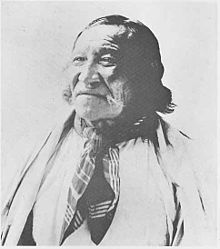- Crow Dog
-
Chief Crow Dog Brulé, Lakota 
Kȟaŋǧí ŠúŋkaBorn 1833 Died 1910 Crow Dog (Kȟaŋǧí Šúŋka 1833–1910) was a Brulé Lakota subchief, born at Horse Stealing Creek, Montana Territory, he was the nephew of former principal chief Conquering Bear who was killed in 1854 in an incident which would be known as the Grattan massacre. Crow Dog was one of the leaders who helped popularize the Ghost Dance. On August, 5 1881, after a long simmering feud, Crow Dog shot and killed principal chief Chief Spotted Tail (who was also at the Grattan Massacre), on the Rosebud Indian Reservation. A grand jury was convened and he was tried and convicted in Dakota Territorial court in Deadwood, South Dakota and sentenced to death which was to be carried out on January 14, 1884. He was imprisoned in Deadwood pending the outcome of his appeals. According to historian Dee Brown in his bestselling book, Bury My Heart at Wounded Knee:
"White officials ... dismissed the killing as the culmination of a quarrel over a woman, but Spotted Tail's friends said that it was the result of a plot to break the power of the chiefs...".[1]
In 1883 writs of habeas corpus and certiorari were filed on his behalf by lawyers who volunteered to represent him pro bono, his case was argued in November, 1883 before the U.S. Supreme Court in Ex parte Crow Dog. On December 17, 1883 in a unanimous decision the court ruled that according to the provisions of the Treaty of Fort Laramie signed on April 29, 1868 and approved by Congress on February 28, 1877, the Dakota Territorial court had no jurisdiction over the Rosebud reservation and subsequently overturned his conviction.[2][3] This ruling cited a previous Supreme Court ruling in Worcester v. Georgia, 31 U.S. (6 Pet.) 515 (1832), a case brought by the Cherokee tribe against the state of Georgia, in which the court ruled that Native Americans were entitled to federal protection from the actions of state governments which would infringe on the tribe's sovereignty.
In response to the ruling in Ex parte Crow Dog, the U.S. Congress passed the Major Crimes Act (18 U.S.C. § 1153) in 1885. It places 15 major crimes under federal jurisdiction if they occur on Native territory, even if both perpetrator and victim are Native American.
See also
- Leonard Crow Dog
- Ex parte Crow Dog
References
- ^ *Brown, Dee (1970), Bury My Heart at Wounded Knee, Bantam Books, ISBN 0-5531-1979-6
- ^ Crow Dog's Case: American Indian Sovereignty, Tribal Law, and United States Law in the Nineteenth Century (Studies in North American Indian History) By Sidney L. Harring p. 107 Publisher: Cambridge University Press (February 25, 1994) Language: English ISBN 0-521-46715-2
- ^ Famous American Crimes and Trials: 1860-1912 by Frankie Y. Bailey, Steven M. Chermak p. 101-105 Publisher: Praeger Pub (October 2004) ISBN 0-275-98335-8
External links
Categories:- Lakota leaders
- Native American people of the Indian Wars
- 1910 deaths
- 1833 births
- People from Montana
Wikimedia Foundation. 2010.
